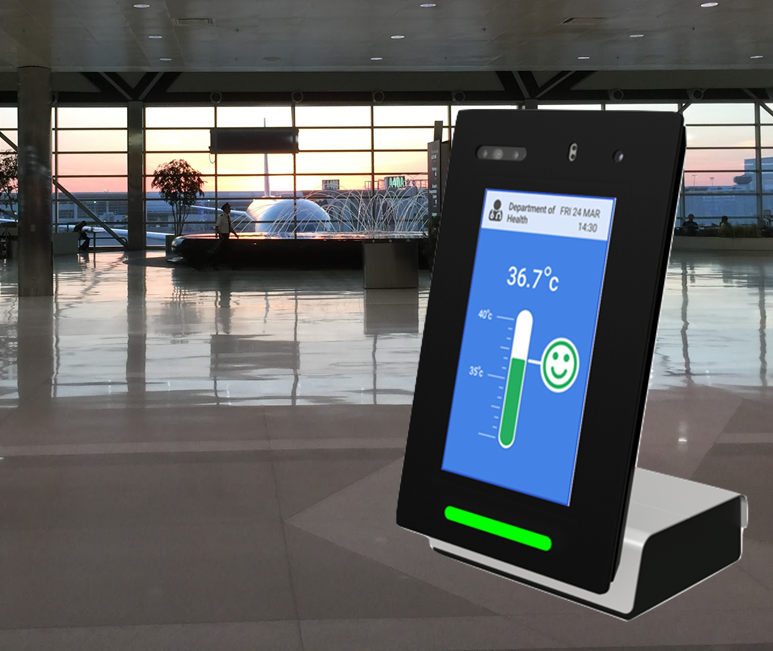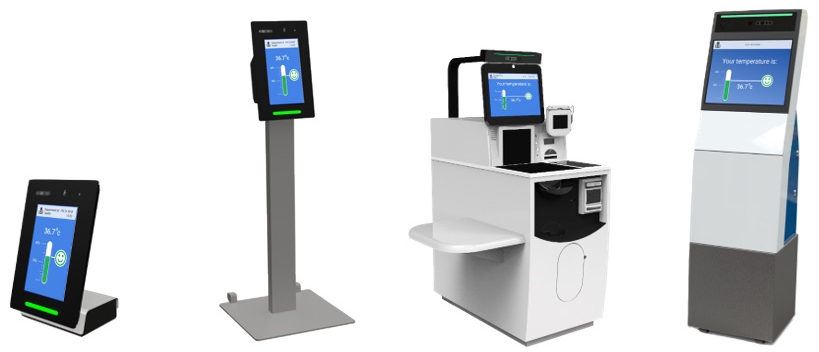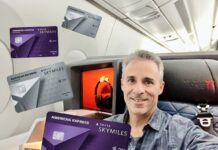NOTICE: This post references card features that have changed, expired, or are not currently available

I love to travel. Friends sometimes ask me “don’t you get tired of it?” Nope. Most of the usual headaches associated with air travel haven’t been an issue for me since I’ve become enmeshed in points, miles, rewards credit cards, and elite status shortcuts. Here are some examples:
- Airport security: I breeze through identity check thanks to CLEAR and then breeze through security without removing shoes or items from my bag thanks to TSA Pre✓. CLEAR is free for me since it’s a Delta Diamond elite status perk (which I get through credit card spend). And Global Entry (which includes TSA Pre✓) enrollment was free thanks to any number of credit cards I own or have owned in the past.
- Airport lounge access: I almost always have free lounge access thanks to credit cards I own. This includes Priority Pass lounges thanks to several different cards, and Delta lounges, Centurion Lounges, Escape Lounges and more thanks to my Amex Platinum card. Sometimes lounge access is granted thanks to using miles to book international business or first class.
- In-flight comfort: I usually sit in business or first class in-flight thanks to either free upgrades from my Delta Diamond elite status or from booking premium cabin awards with airline miles.
Ultimately, for me, it’s the destination that matters. But getting there comfortably with minimal hassle makes all the difference in the world.
These days, though, I’m thinking more and more about car travel. Once the stay-at-home orders lift, I’m wondering where can we go without stepping on a plane? Can we find a hide-away with a view where we can enjoy travel while minimizing the chance of getting and spreading COVID-19?
It’s not that I’m scared of getting COVID-19. Instead, I just don’t want to risk being part of the problem. I don’t want to risk others by potentially spreading COVID-19. And, as things stand today, it’s pretty hard to travel by air without coming in close contact with many others. The chance then of getting a virus and passing it along to others seems pretty high.
If I’m hesitant to return soon to flying, what about those who don’t love air travel? I’m betting that it will be a very, very long time before flying becomes anywhere near as popular as it was just a few months ago.
A potential partial solution

Elenium Automation has announced that they have a prototype touchless “triage kiosk” to help detect whether a traveler is infected:
To ensure the health safety of passengers and staff, Elenium has developed a self-service technology that can detect a passenger’s temperature, heart rate and ask a series of questions from a distance of 1.5 metres at any airport touchpoint such as a kiosk, bag drop, security or immigration – enabling the self-service device to act as a screening station for potential symptoms of COVID-19. In partnership with Amazon Web Services, Elenium has also developed “hands free” technologies that enable touchless use of self-service devices, thereby further minimising the potential of any virus transmission.
As reported by Runway Girl Network, Etihad plans to test this technology at the Abu Dhabi airport starting at the end of April. The tests will be with volunteers at first, but later with outbound passengers. The goal is to stop people from boarding aircraft if they present symptoms.
I’m not going to argue that Elenium’s technology is the solution. They specifically assert that the device “is not designed or intended to diagnose medical conditions.” At best, it is an early warning indicator. Plus, I’d argue that it’s not enough…
My proposed solution
I don’t think we’ll ever have technology that can perfectly identify contagion hazards, but I do think that a combination of technology and policy has the potential to make things better. It may be possible to significantly reduce the spread of contagion through air travel with two key changes:
- Install health screening technology in all airports and require passengers to pass this test before being allowed to enter security lines. This will prove to be a very expensive solution since it requires med techs to be standing by to offer secondary screening to those who fail the automated test.
- Eliminate all flight change and cancellation fees. I believe this to be a necessary part of the solution as I’ll explain below.
Airport health screening technology
No matter what technology is used, it won’t work perfectly. Consider that up to 25% of people with COVID-19 have no symptoms at all. It’s very unlikely that any screening technology or processes will be able to catch these symptom-free contagion carriers. Sure, it’s theoretically possible to add COVID-19 rapid testing to the health screening, but that would be extremely invasive. Plus, it would do nothing to stop the spread of other viruses or COVID mutations.
I don’t think it’s necessary for airport health screening to work perfectly. Instead, I think we need people to believe that it is reasonably likely that they’ll be stopped if they’re contagious. As long as this is true, individuals who suspect that they might be contagious will likely change or cancel their trip. I believe that no one would want to pack and make their way to the airport only to be told to go home. Those who know that they’ve been in contact with others with COVID-19 or any other dangerous virus will hopefully choose to put off their trip until they know that they are healthy.
Eliminate flight change and cancellation fees
The whole reason that I believe that airport health screening has a chance of working is that I think that many people will choose not to show up at the airport in the first place. Imagine, for example, waking up with a sore throat on the morning of planned travel. Maybe you have seasonal allergies or maybe you’re truly sick. You don’t know. But, in this future scenario, you do know that you might get to the airport and be turned away. Or, worse, you might fail the screening at the end of your trip when you want to return home. So, instead of chancing it, you change your travel plans.
Most people won’t change their travel plans if doing so requires paying change or cancellation fees. Instead, they’ll risk it. And, most likely, a large percentage of these people will pass the screening and get on board. Some percentage of these will be contagious.
So… eliminating flight change and cancellation fees is a necessary component to make this work. We need people to police themselves and stay home when there’s a chance that they’re sick. This will happen only if there are no financial losses when doing so. Of course it would help to also eliminate hotel, tour, and cruise change and cancellation fees…
It may happen without legislation…
If health screening technology is added to all airports, travel providers are likely to find that it’s in their best interest to waive change and cancellation fees. Consider, for example, if you’re considering booking a big trip, but the tickets or lodging or tour or whatever is nonrefundable. Maybe in the past you would have risked it, but now you know that there’s a chance that you’ll be turned away at the airport. You then may decide not to book the trip, or maybe you’ll pay very expensive “cancel for any reason” travel insurance. Travel providers who offer free changes and cancellations will have a huge competitive advantage.
Bottom Line
I think that it’s theoretically possible to drastically reduce the spread of contagions through air travel with two major changes: 1) Add touchless health screenings to all airports; and 2) Eliminate travel change and cancellation fees.
I don’t think that my suggestions are likely to happen anytime soon. It’s too expensive and, in some ways, too radical for a democratic nation to enact. I also don’t think that what I’ve proposed here is anywhere near a perfect solution. It’s unclear how we would enforce social distancing as lines grow long while people wait to be assessed. Assessment technology will raise serious privacy concerns. And false-positives (where people are turned away from the airport despite being healthy) will lead to many, many issues.
I also don’t believe that I know best. This post is nothing more than my naive musings. I have no doubt that better minds than mine can come up with better solutions. Unfortunately, I expect that any solution will be nearly impossible to put into practice.
On the other hand, a few months ago I wouldn’t have believed that a virus could lead to our current situation with most businesses shuttered, travel at a stand-still, and nearly everyone stuck at home. Maybe the world is ready for radical change after all.




![Hyatt goes next level with Mr & Mrs Smith [Integration “early 2024”!] a heart shaped sign over a house overlooking a body of water](https://frequentmiler.com/wp-content/uploads/2023/05/Mr-and-Mrs-Smith-and-Hyatt-218x150.jpg)
[…] Can airport health screening save air travel? […]
My guess: in less than a year, there will be no more COVID-19 and all these concerns will seem over-dramatic. Kind of like the fear of terrorism after 9-11.
People would have to be pretty ignorant to believe screening is going to stop diseases from spreading. Most diseases have a long incubation period where are you can spread it but do not show it. Your example of 25% people being asymptomatic completely ignores the fact that those who got sick still were asymptomatic before that and we’re spreading the disease unwittingly.
I like this. In fact, I think the latter (no change fees) is way more important than the former. It doesn’t feel good to travel, go to school, or go to work while sick… but we do it anyways because the penalty is high. Eliminating the fine only cuts down part of the penalty, but it helps. Regardless of airport screening policies, more people will be able to afford and hence willing to defer the trip.
Of course it doesn’t eliminate the risk of getting or spreading any disease, but nothing does. All we need is to reduce the risk to a tolerable level.
Life is full of risks….this is no different.
Agreed!! Only time you may want to avoid travel on planes, cruises, etc, is if you are older with underlying issues. The rest of us should get on with our lives.
I don’t have more or better answers as to what should or shouldn’t be done than anyone else at this point, but as someone with two healthy friends under 40 years old who have been hospitalized (one requiring oxygen, both thankfully on the road to recovery), I’d urge you to reconsider the notion that it is only a worry to people who are older with underlying issues.
Nick – Sorry about your friends. The statistics I’ve read say that 80% have mild symptoms that don’t require a doctor and that 98% recover. Not sure the solution is to keep our economy shut down any longer because then you have people dying from poverty, suicide, drugs, abuse etc. That’s already happening. Hope we get this sorted out for everyone’s sake!
just curious….are they obese/overweight? Or, if they are trim, would they be overweight if they didn’t exercise?
I am not sure what the solution is unless there is a vaccine.
I just think this would be a show stopper for leisure travel. This means we have to have our temperature (health) checked wherever we go. There will be a scanner on the tour bus, restaurants, museums, planes, trains, etc. Every time your step in and out of somewhere, you will get scanned and rescanned. How can you go on leisure travel knowing that at any time in point, you may get quarantined. Then what happens if you don’t pass a health test? What if the machine makes an incorrection detection? What if I have to get back home to go to work, but I get stuck over seas? Will I be paranoid evetime I get scanned? How is this leisure travel?
That very well might be part of the solution. No leisure travel until we’ve got a handle on Covid-19.
[…] Airport Health Screening Save Air Travel?: This is an excellent post by Greg from The Frequent Miler. I agree that health screenings/temperature checks will be the new normal. These must be combined […]
Won’t work for me most of the time, I’m a runner with a resting pulse around 50 and I almost always take aspirin before I fly to keep from getting headaches.
Pulse low, no temperature.
Correct this is going to be really rough and by the way ur not PC.
Take Care
CHEERs
Regardless of whether there’s any type of health screening at airports, it will probably take free changes to get people flying again. If other airlines fail to adopt policies similar to Southwest’s, planning a leisure trip will become a financially risky proposition.
We now live in a world where lockdowns can happen at any time. Even if you are perfectly healthy, the hotel you planned to stay at may suddenly close for quarantine or go bankrupt. Or the beach you planned to visit may close because a local mayor says so.
I wish this were not the case, but it will probably be a very long time before people will be vacationing again.
Most asymptomatic people simply don’t know they are sick. So the solution fails right there.
Also you think people are at liberty to cancel or change their plans if they are not afraid to change their tickets but that is not true. They also have hotel and event reservations at their destinations. Should those also be cancelable for free? That opens Pandora’s box.
Finally lot of travel is for business. People don’t usually travel for business because they want to. It’s the demand of their work. The whole work model must change if people with possibly little cold are not going to fly.
Truly am not sure about this one, Greg.
You have addressed one concern. On a plane with 100 passengers (and crew members) for illustration purposes, 25 will be asymptomatic carriers. Spread them through the plane and….
Furthermore, how many of us could have just a garden variety sniffles or cold, and our temperature might be elevated… Should we not fly? Health care workers or first responders should be banned from flying (we are exposed)?
If you saw what we see, and how this is being reported and handled versus what is happening, you might understand that this is a bunch of loose cannons firing in all directions jockeying for political gain and fame.
From my perspective, this is not a solution… Think just what hassles we sometimes have with carry on luggage,
It doesn’t do any good to have CLEAR or TSA PRE if we are all stuck in line “forever” getting a health checkup. The health check will take several minutes (at best per person) and it will dilute the line volume into the TSA security lines.
In most airports in Asia they put in place temperature scanning in prior flu virus outbreaks. While not perfect it helps keep it quick and simple to this day. In the future, we will see this at airports and cruise ports all over the world. I would also say that we’ll see FLIR systems setup to scan crowds as well. Sort of like they do with facial recognition in the Dubai Aquarium tunnel.